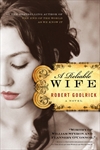Bruce Sterling Session
Monday, March 16th at 05:00 PM
PRESENTERS
* Bruce Sterling – Wired.com
DESCRIPTION
His state-of-the-cybersphere analyses are always a highlight of SXSW Interactive. Don’t miss what the veteran science fiction writer and industry pundit has to say about the wired world this year.
MONIQUE’S NOTES
Let’s talk about our relationship. Yours and mine.
I’m an author. I’m a journalist.
There’s my business card.
With a phone and fax number.
Look. These artifacts are called books. I know you’re not used to seeing them.
Let me explain how they work.
I write a lot of words in a row. A whole lot of words. Not even character count. Then I go back and carefully restructure them and move them until they have a coherent storyline. Then I send them to my agent who sends them to a publisher who sends it to an editor and eventually it goes to a distributor who handled cult activities like author tours. And it goes to retailers who sell it to people and then return unsold copies.
This whole business has hit the skids.
Publishing has never been such a parless states. If you were an author in this system, you go 4-8% in a not really accurate royalty system. But that was ok because you, as an author, were likely to go screwy anyway.
As an author and journalist, I feel much more sorrow for the state of editors.
Editors/Publishers model is not working out. Now you have the cliched perfect storm of troubles.
Sterling on the book
I have them. I thought about spamming the audience with them. Or hiding them and geo-locating them …
No this belongs to someone who is young. Under 20?
There is not a teen in the room? So much for this being a teenagers. Think. Just break times’ hourglass. Just take them away young people. I don’t expect you to read them. You txt.
How do we face this problem?
Twitter feed: media is dying
Print media spent 20 years making fun of a paperless society.
Could I put it on Kindle? Oh it’s there. Am I happy about that? No. Will anyone be reading a Kindle when one of them is my age? No. It’s like an atari.
Traditionally authors burn all their love letters on their death bed. Now we issue them under creative commons.
WIRED Italia. Look at the size of the ads in this baby.
[ … monique distracted … ]
What concerns me is the death of the audience. It doesn’t matter what happens to me. I’m better off than most authors I know, most journalists I know. There was a period of greater prosperity. I wonder why, why do I have a relationship to you. Why do you have a relationship to you?
My twitter group is bigger than you, more widely spread than you. They are probably a better audience than you. They can put up with more than you. They’ll RT me. I know some of you are gathering together in the back conspiring … drifting … you’re the people formerly known as the audience. And you’re forfeiting the benefits of the audience. Paying attention to the point of being able to discuss it.
[Bruce opens a drink. I used to have a great parties. It was my house. We were there to enjoy ourselves. Opens chips. You thought you were getting chips, but I was in control of the chips. The servers. They were in my corner.]
MT: Best laugh out loud.
Old social media (parties) were bring who you trusted.
The party audience was replace by social media influencers. Their capacities were built up. It was impossible to open up to this audience because they’d tweet their buddy list. It’s a technologically transformed situation and the loss is a social loss.
There’s a loss.
How do we restore those days? They aren’t coming back. Why do I keep up author appearances? Why do I have to keep up a level of respect? You’re not my friends. I’m not your host.
[cookie eating now]
Even if you’re broke, you will still be densely connected.
Connectivity is a symbol of poverty.
I might become boring enough that no one comes by anymore. You can lose your fame to the point that no one shows up.
I can’t throw a party and sit around and talk about vinyl and books. I feel the loss keenly. Playing lost vinyl for your friends. This has vanished.
I have little parties in those places with which I have similar relationships to this one. Lift Conference is getting bigger every year. Reboot in Denmark, great conference again. Amsterdam is on top of their game.
USA could be like Canada. We’re afraid of French, Germans. We’re liking Canadians: cute, cuddly. They’re afraid of being us.
Let me read this silly stuff to explain what’s happening:
“Melt down money-quake yuppy flu end of the world as we know it the long emergency bush’s legacy the great reset the inflection un-real estate communism 2.0 … the long doom.”
This is what I think books will look like in the future. Austin is a bookish town. Book culture will mutate on the way down.
Austin bookstore I saw on the way into town. HP Lovecraft: greatest, most creative … and when he wasn’t getting commercial work he basically started blogging. Here are his miscellaneous writings. A small fraction of his discourse and it’s bigger than his collective works. This non-fiction, community organization was more time than his stories.
Within his community, he was trusted. The American Amateur Press Association was his blog network. A lot of writers came out of this association. Robert Block. The Lovecraft circle who grew up from a B.
He perished.
What does the future look like?
Go to Brave New Books in Austin. Right-wing nutty.
This is a harbinger of something interesting. The tactics are more important here.
[ … more to come … 15 minutes of battery left … ]




















